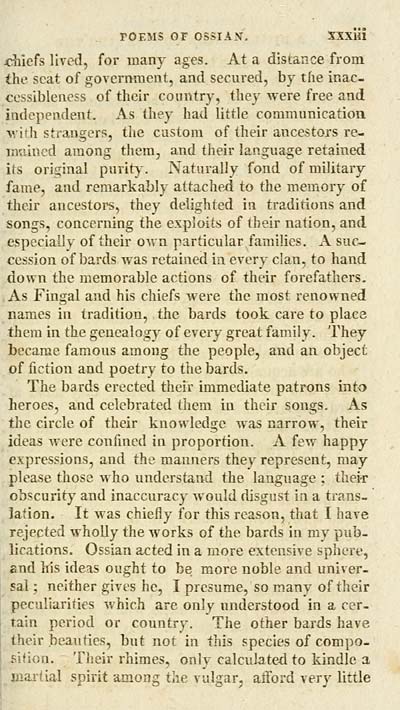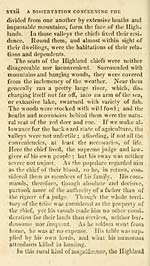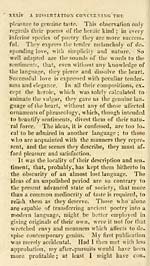Ossian Collection > Poems of Ossian > Volume 1
(51)
Download files
Complete book:
Individual page:
Thumbnail gallery: Grid view | List view

POEMS OF OSSIAN. XXXlil
chiefs lived, for many ages. At a distance from
the scat of government, and secured, by the inac-
cessibleness of their country, they were free and
independent. As they had little communication
with strangers, the custom of their ancestors re-
mained among them, and their language retained
its original purit)-. Naturally fond of military
fame, and remarkably attached to the memory of
their ancestors, they delighted in traditions and
songs, concerning the exploits of their nation, and
especially of their own particular families. A suc-
cession of bards was retained in every clan, to hand
down the memorable actions of their forefathers.
As Fingal and his chiefs were the most renowned
names in tradition, the bards took care to place
them in the genealogy of every great family. They
became famous among the people, and an object
of fiction and poetry to the bards.
The bards erected their immediate patrons into
heroes, and celebrated them in their songs. As
the circle of their knowledge was narrow, their
ideas were confined in proportion. A few happy
expressions, and the manners they represent, may
please those who understan^d the language ; their
obscurity and inaccuracy would disgust in a trans-
lation. It was chiefly for this reason, that I have
rejected wholly the works of the bards in my pub-
lications. Ossian acted in a more extensive sphere,
and his ideas ought to be more noble and univer-
sal ; neither gives he, I presume, so many of their
peculiarities v/hich are only understood in a cer-
tain period or country. The other bards have
their beauties, but not in this species of compo-
sition. Their rhimes, only calculated to kindle a
martial spirit among the vulgar, aiford very little
chiefs lived, for many ages. At a distance from
the scat of government, and secured, by the inac-
cessibleness of their country, they were free and
independent. As they had little communication
with strangers, the custom of their ancestors re-
mained among them, and their language retained
its original purit)-. Naturally fond of military
fame, and remarkably attached to the memory of
their ancestors, they delighted in traditions and
songs, concerning the exploits of their nation, and
especially of their own particular families. A suc-
cession of bards was retained in every clan, to hand
down the memorable actions of their forefathers.
As Fingal and his chiefs were the most renowned
names in tradition, the bards took care to place
them in the genealogy of every great family. They
became famous among the people, and an object
of fiction and poetry to the bards.
The bards erected their immediate patrons into
heroes, and celebrated them in their songs. As
the circle of their knowledge was narrow, their
ideas were confined in proportion. A few happy
expressions, and the manners they represent, may
please those who understan^d the language ; their
obscurity and inaccuracy would disgust in a trans-
lation. It was chiefly for this reason, that I have
rejected wholly the works of the bards in my pub-
lications. Ossian acted in a more extensive sphere,
and his ideas ought to be more noble and univer-
sal ; neither gives he, I presume, so many of their
peculiarities v/hich are only understood in a cer-
tain period or country. The other bards have
their beauties, but not in this species of compo-
sition. Their rhimes, only calculated to kindle a
martial spirit among the vulgar, aiford very little
Set display mode to: Large image | Transcription
Images and transcriptions on this page, including medium image downloads, may be used under the Creative Commons Attribution 4.0 International Licence unless otherwise stated. ![]()
| Early Gaelic Book Collections > Ossian Collection > Poems of Ossian > Volume 1 > (51) |
|---|
| Permanent URL | https://digital.nls.uk/77946877 |
|---|
| Shelfmark | Oss.79 |
|---|---|
| Additional NLS resources: | |
| Attribution and copyright: |
|
| Description | " ... to which are prefixed, 'Dissertations on the aera and poems of Ossian translated by James Macpherson'". |
|---|---|
| Shelfmark | Oss.79-80 |
| Additional NLS resources: | |
| Description | Selected books from the Ossian Collection of 327 volumes, originally assembled by J. Norman Methven of Perth. Different editions and translations of James MacPherson's epic poem 'Ossian', some with a map of the 'Kingdom of Connor'. Also secondary material relating to Ossianic poetry and the Ossian controversy. |
|---|
| Description | Selected items from five 'Special and Named Printed Collections'. Includes books in Gaelic and other Celtic languages, works about the Gaels, their languages, literature, culture and history. |
|---|

